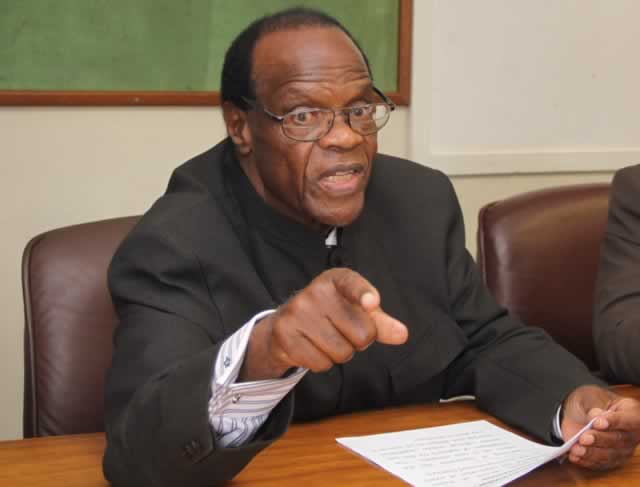Cheapening the police force, its authority


Kombi crews are one section of society that has successfully demystified the police force and their display of disrespect for the police breeds a generation of people who have no regard for the law
Ignatius Mabasa The Column
THERE is a generation of black people that remembers a lot of dehumanising and brutal things that colonialism did to them, and their long-term effects.
Paradoxically, colonialism had institutions and systems for governance that as black people we found ourselves needing in order to serve the new government.
For example, while it was apparent that the colonial police force was biased and racist, it was necessary for us to adopt some of its professional standards, ethics and codes of conduct in order to smoothly transition from the old to the new.
So many things have changed since 1980 and we don’t expect the police to be brutal like in the colonial era.
Yet, something is wrong with the conduct of some police officers.
When I moved from rural Mount Darwin to Salisbury in the late 1970s, I was taken in by my aunt and her husband. My aunt was a housewife while her husband was a police instructor at Tomlison Depot.
Mr Madhafi was his name.
He was a tall man and was built like a tractor, and everything about him, including his moustache, exuded the authority of the policeman that he was.
While my aunt made sure she washed and ironed his uniforms very carefully, so as to bring out the best in the fabrics, Mr Madhafi on the other hand polished his shoes and belts until they shone like new buttons.
When you saw him fully dressed in his police uniform before he left the house, you would really feel that besides the uniform, the spirit of being a policeman had now descended on him and taken over.
Looking grand and exquisite like that, I sometimes thought Mr Madhafi expected me and my cousins to salute him as he stood towering above us, with his instructor’s baton tucked in his armpit.
Mr Madhafi was very strict and professional.
Sometimes when he was driving or walking around the police camp, he would stop and publicly rebuke police recruits who would either not be dressed properly or not behaving in a manner consistent with being a policeman.
Almost everything for Mr Madhafi was about rules and the law — making sure everything is done correctly — especially things to do with the profession of policing.
He also expected us to wash our bodies and brush our teeth properly, and he would inspect us from time to time.
He is late now, and I am writing about him because I saw things happening to the police that I know would have driven him mad.
One Sunday afternoon, I was driving from Chitungwiza into town when I was stopped at a roadblock.
After the policewoman who had asked me to park my car on the side of the road had checked my driver’s licence, she told me that I was free to go.
In front of me was a kombi that had also been stopped.
There, in front of the kombi, I saw the driver and his conductor talking with the policeman.
What shocked me is the fact that one of the two kombi men casually took the baton from the policeman’s hands!
Once he got the baton stick in his hand, he started playing with it, twirling it and doing some stupid things with it.
I could not hide my shock, which I think the policeman noticed.
It must be what prompted him to claim his baton back.
I said to myself, surely such a thing would never have happened in the days of Mr Madhafi.
He would confront such a policeman and march him to the charge office to explain his unbecoming and unprofessional behaviour.
A policeman’s authority is in his uniform which includes the hat, handcuffs and baton. They should be on him all the time, unless under very extreme circumstances.
If a policeman allows a person who has broken the law, as I suspect these kombi men had done, to play with his baton, it is a scandal.
The lawbreaker, through such actions is actually saying, “Look at me, I can play with the tail of a lion and it will not bite me.”
It is such public display of disrespect for the police that breeds a generation of people who have no regard for the law.
Such behaviour allows ordinary people to cheapen the police force and its authority. Such behaviour should be a punishable and even dismissable offence because it brings the police force into disrepute.
If there is a section of society that has successfully demystified the police force, it is these kombi people.
They are now encouraging and influencing ordinary citizens to think that the police are a lot that one can fool around with. I have seen kombi people so many times refusing to stop at a police roadblock. It seems they now derive satisfaction from doing unlawful things right in front of the police, as if to dare them.
The other incident which got me worried was when again I saw a kombi that had been ordered off the road by the police. The kombi crew was negotiating or trying to explain something to a policeman. There is nothing wrong in trying to explain yourself, but then, one of the men went on to hold the policeman’s hands. Again, like in the baton stick incident, he started swinging the policeman’s arms. There is power in touching! And holding even has connotations of subduing. This policeman was on duty and he should have stamped his authority, but he agreed to allow culprits to hold his hands like a child.
There must be distance between the police and the public because the police represent the law and especially if they are on duty and that gap or distance is not closed — then that is corruption. If I can use my hand to touch a policeman — what I am saying to him is, “Forget about your job and being a professional. We can talk, we are friends.”
I am not saying the police should not be approachable. The police work with people and society and if they do not interact with the people, they will have failed in their duty.
I was once stopped by highway patrol police near Henderson Research Station the other time.
The policewoman who came to check my particulars and my car was very friendly but professional.
She greeted me saying, “Makadiiko aTezvara?” To which I responded, “Tiripo muroora. Rakadii basa?” She went on to tell me that she was going to issue me with a ticket for having unsecured luggage on the roof of my car.
Still maintaining our register of muroora and tezvara, she remained firm and professional. She was not intimidating and even when I left, I thanked her for being gracious and representing the police force very well.
The other incident involving the conduct of the police was captured in this poem written by a witness:
I was trudging along Leopold Takawira
Looking for a reasonably priced pair of shoes
When I saw a towering policeman towing,
A miserably thin boy, handcuffs biting into his wrists.
“Must be another little thief,” I said to myself.
When the policeman stopped to chat with some friends,
The little thief also stopped, listening to the conversation.
I didn’t like his bloody red eyes and oversize trousers
That covered his rickety and cartoon-like shoes.
Yet, my eyes went back to the teeth of the cuffs, for
I detest anything that bites anyone’s joy.
As the two resumed their journey,
I overheard the little thief say to the policeman:
“I hadn’t noticed you were just behind me. But I also acted very foolishly today.”
I eventually went my way, but until night time,
I was sleepless, tossing and turning thinking:
How come those two appeared just like friends?
(By Memory Chirere)
The things to note are, how the policeman after arresting this boy and is taking him to the police station, can afford to stop and chat with friends, while his accused is patiently waiting in handcuffs and enduring embarrassment. Then, also note how the “thief” tries to appeal to the softer side of the policeman by giving the impression that if he had noticed the policeman behind him, he would not have done what he did.
The law should not be observed because there are police officers to enforce it around. Our police must be firm and professional.
I once worked with a married man who used to confide a dark passion and a dire dream of getting a girlfriend in the army or police.
Love was not the motive of his desire, because all he wanted was just a girlfriend — any girlfriend, as long as she was in the army or police.
The public should not expect protection and professional service by the same police they are abusing and disrespecting.









Comments